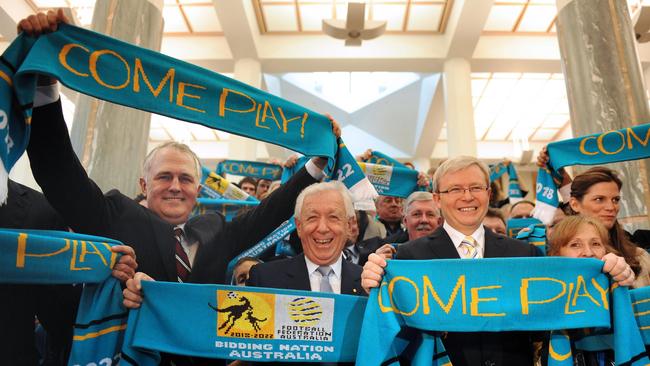Middlemen offered academics cash to criticise rival World Cup bids
Adelaide university economist offered Qatari cash to write a report criticising Australia and sabotage our World Cup bid, emails reveal.

Middlemen acting for Qatar pretended to represent concerned taxpayers when they approached two influential professors and offered them cash to write damaging academic reports against rival bidders to host the World Cup, the leaked emails disclose.
Professor Dennis Coates, an economist from Maryland University, admitted last week that he had been paid $US9,000 to write a report on deficiencies of the bid from the US, which was Qatar’s chief rival.
His 23-page report cast doubt on claims by the US bid that the tournament would generate billions of dollars in revenue for the country and concluded: “US taxpayers are better off saying no to an expensive and secretive World Cup bid.”
Professor Richard Pomfret, an economist at Adelaide University, was also offered money to write a similar paper criticising Australia, Qatar’s other main rival. He turned the offer down.
Both academics said the middlemen did not reveal that they were being paid ultimately by the Qatar bid committee. “The subterfuge leaves a bad taste,” Pomfret said when he learnt about the Qatari involvement.
Coates’s payment to write the report was arranged by Brian Wagner, then an executive from the New York office of public relations company Brown Lloyd James (BLJ). The office is now known as BLJ Worldwide.
Wagner had approached Coates in March 2010 claiming to represent an “informal organisation of concerned taxpayers who are very troubled by the lack of cost estimates available relating to the costs of the US’s World Cup bid”.
In his “strategy” email in May 2010, Michael Holtzman, BLJ Worldwide’s president, reported back to the Qatar bid: “We have recruited the head of the Federation [sic] of Sports Economists to write a major study on how the US World Cup lost money, and how the 2018-2022 proposal would also lose money.”
Coates, who is the president of the Association of Sports Economists, did not declare the payment in his report, which was given extensive media coverage.
Last week, Coates said his report expressed views he had already formed and he had not been influenced by BLJ. He said it had never occurred to him to declare the payment in his report but said he did not like the idea that he had been “played” when told of Qatar’s involvement.
In October 2010 Pomfret was approached by Peter Reid, an Australian lawyer, who claimed to represent an international businessman concerned about the use of public funds for the bid. In a letter he asked Pomfret whether he had seen Coates’s report and wondered if for “a small fee” he might be willing to write a similar one for Australia. Pomfret turned him down.
Last week Reid claimed he could not recall sending the letter even though it was on his headed notepaper in an attachment sent from his email account. “I have never had any dealings with Qatar nor anyone representing Qatar,” he said.
Wagner said he could not recall whether Qatar was the client who funded Coates’s report and when told of the academic’s disappointment at not being informed of Qatar’s involvement, he referred all questions to BLJ Worldwide. It failed to respond to questions.





To join the conversation, please log in. Don't have an account? Register
Join the conversation, you are commenting as Logout